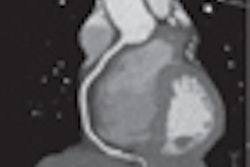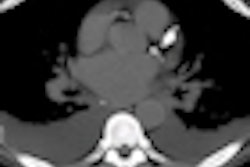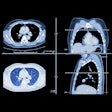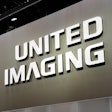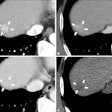Taking aim at the CT radiation overdose incidents that have roiled imaging facilities throughout California, the state's Assembly on Thursday overwhelmingly approved legislation that would establish protocols and safeguards to protect patients from overdoses.
SB 1237 now moves back to the California Senate, where a procedural concurrence vote is scheduled for today before the bill is sent to Gov. Arnold Schwarzenegger for his signature, according to Taryn Kinney, a legislative assistant from the office of the bill's sponsor, Sen. Alex Padilla (D-Pacoima). The Senate originally passed the legislation on May 28 by a vote of 24-5.
The bipartisan Assembly vote was 70-4 in favor, according to Kinney. Schwarzenegger is said to be reviewing the bill's language, but his office was closed on Friday and therefore unable to comment for this story. If signed, the bill would become effective July 1, 2012.
Last fall the California Department of Public Health learned that over an 18-month period some 260 patients at Cedars-Sinai Medical Center in Los Angeles undergoing CT perfusion scans were exposed to radiation doses eight times higher than normal.
A subsequent review found that other centers in the state, including Los Angeles County-USC Medical Center in Los Angeles; Mad River Community Hospital in Arcata; Glendale Adventist Medical Center in Glendale; Providence Saint Joseph Medical Center in Burbank; and Bakersfield Memorial Hospital in Bakersfield, among others, had made similar mistakes, implicating the medical staff as well as scanner manufacturers in the errors.
"The fact that these overdoses continued for 18 months speaks to the urgent need for protocols and safeguards to prevent overdoses in the future," Padilla said in a statement accompanying the bill's Assembly approval. "SB 1237 will provide physicians the information they need to track dose levels and prevent patients from receiving overdoses of radiation."
The bill aims to reduce the risk of overdose by first requiring that radiation dose levels be recorded both on the scanned image and in a patient's health record. It would also require that radiation overdoses be reported to patients, their treating physicians, and the Department of Public Health. The bill requires the same kind of procedural monitoring and reporting on radiation therapy used to treat cancer.
It is estimated that as many as 70 million CT scans are conducted each year throughout the U.S.
CRS grapples with language
Progress toward a final bill has been good, but the devil is in the details, according to attorney Robert Achermann from the California Radiological Society (CRS), which lobbies on behalf of the state's radiology community.
"It's been a really difficult issue and this bill is by no means perfect -- we're neutral on it," Achermann told AuntMinnie.com in a telephone interview on Friday.
One issue has been the sheer technical difficulty of writing rules that communicate complex radiation dose information in ways that are meaningful for both doctors and patients, he said. "I think translating that into something that is important for patients and something they can use is part of the journey we're on," Achermann said.
The language has been amended in the last few weeks to eliminate what CRS considers impractical or unworkable reporting requirements that would interfere with day-to-day medical decision-making.
For example, he said, language requiring that the California Department of Public Health be informed every time a pregnant woman is scanned for any reason -- such as a brain scan -- has been revised to only require reporting for scans that may have resulted in radiation delivered directly to the fetus or embryo.
"If it's known that a woman is pregnant, there may still be diagnostic scans," he said. "So they're letting the medical information dictate whether it's a reportable event or not."
Similarly, a provision requiring that the state be informed any time a CT scan is repeated has been limited to those instances in which a scan wasn't repeated for common reasons such as patient movement -- "or if the exam wasn't ordered by the physician and the amount of dose exceeded a certain level," Achermann said.
Similarly, reporting requirements have been scaled back in the use of radiation for palliative care undertaken to relieve a patient's suffering, he said.
In radiation therapy, healthcare staff will be required to report any treatment in which the radiation dose exceeds the prescribed dose by 20% or more, Achermann said.
Overall, SB 1237's original reporting requirements "were very broadly defined," he said, leaving CRS to work with the bill's sponsors and the Department of Public Health in efforts to restrict reporting mandates to unusual circumstances while excluding them for routine medical care.
CT scanners
The bill also provides an accreditation mandate for CT scanners that would take effect January 1, 2013, six months after the other provisions. This requirement will be mirrored in a new Medicare rule beginning in 2012, but this rule applies only to scanners in outpatient settings. California's law will extend the requirement to all scanners, including those used in the hospital setting.
SB 1237 also requires that scanners that have the capability of providing dose readouts include them in the patient medical record.
"Depending on the type of scanner, it might record the dose in terms of CTDIvol (CT dose index volume) or DLP (dose-length product)", Achermann said. "There's no consistency between the manufacturers whether it's CTDI or DLP," but by now most scanners have some kind of dose-reporting capability, and this bill requires the use of whatever dose-reporting capabilities a scanner has."
Only the U.S. Food and Drug Administration can regulate scanner features, Achermann noted.
"California can't impact the licensing and regulation of scanners. That's the purview of the federal government," he added. "If a machine does something, you can [require that a feature be used], but you can't require that a CT scanner meet some kind of California standard in order to sell equipment," he said.
As a result, features that some have suggested, such as a blinking red light to warn of excessive radiation, could never be part of California's law, he said.
"I think it's appropriate not to unduly burden radiologists and technologists in terms of reporting," Achermann said.
The California Radiological Society would have preferred to wait for the federal regulatory efforts to play out, he said, but given the radiation overdoses that have occurred in the state in the past two years, it's understandable that California lawmakers "would want to get something on the books."
Beyond California, "I think the radiology community around the country has come to realize there's a need to do more," and it's happening in important initiatives such as the ACR's dose registry pilot project, Achermann said.
By Eric Barnes
AuntMinnie.com staff writer
August 28, 2010
Related Reading
SoCal hospitals say patients got too much CT radiation, August 6, 2010
Calif. Senate passes radiation bill, June 2, 2010
FDA hearings rise above medical radiation rhetoric, March 31, 2010
Lawsuit hits GE in Alabama CT overdose case, December 18, 2009
FDA finds new cases of CT radiation overexposure, December 7, 2009
Cedars-Sinai raises tally of radiation overdose cases, November 13, 2009
Copyright © 2010 AuntMinnie.com






